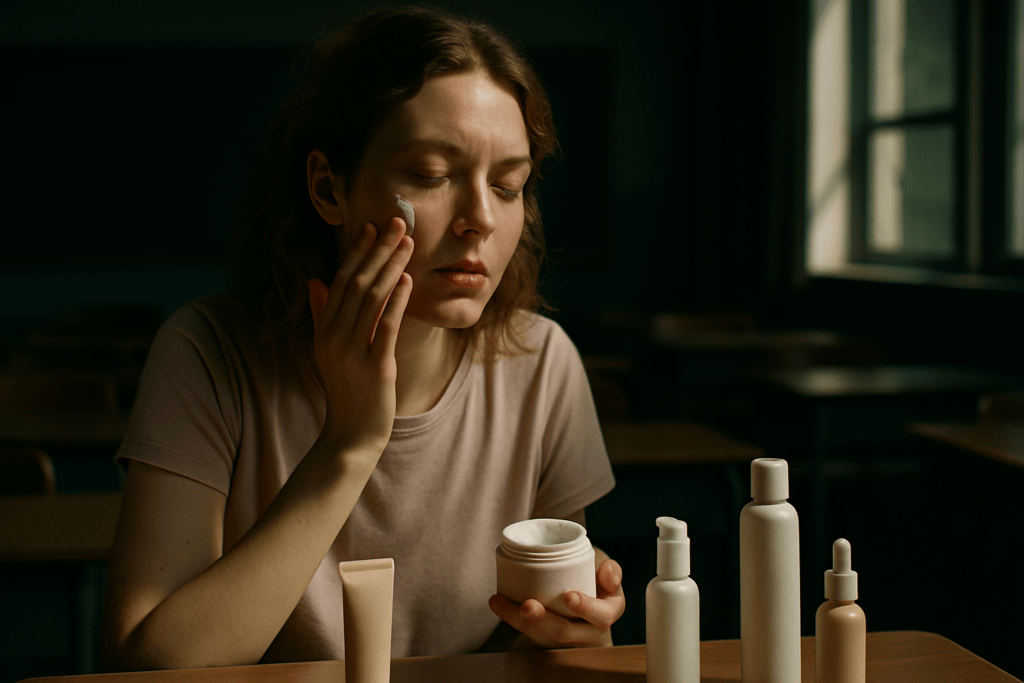Skincare feels complicated these days. Walk into any store and you’ll see hundreds of products making big claims.
Most people end up buying things they don’t need that might actually make their skin worse.
According to a 2023 survey by the American Academy of Dermatology, 72% of adults feel confused about which skincare products they really need.
Truth is, effective skincare doesn’t require a 10-step routine or expensive products.
Research published in the Journal of Cosmetic Dermatology found that consistent use of a few well-chosen products typically outperforms complex routines.
Let’s cut through the marketing and focus on what actually works.
Start Simple and Add Products Slowly
The biggest skincare mistake?
Doing too much too soon.
Dermatologists at Stanford University found that patients who introduce multiple new products at once can’t identify what’s helping or hurting their skin. The research recommends starting with just three basics:
- Gentle cleanser
- Moisturizer
- Sunscreen
That’s it.
A Reddit thread in the r/SkincareAddiction community with over 15,000 upvotes confirmed this minimalist approach works best for beginners: “I fixed my skin by using fewer products, not more,” wrote the top commenter.
Give your skin 2-3 weeks to adjust to these basics before adding anything else.
When you do add something new, introduce only one product at a time and use it for at least two weeks before judging results. Keep a simple note in your phone tracking any skin changes.
Figure Out Your Real Skin Type
Many people misidentify their skin type and use the wrong products as a result.
A study in the International Journal of Cosmetic Science revealed that 65% of women incorrectly self-diagnosed their skin type.
Simple Test to Determine Your Type:
- Wash face with mild cleanser
- Wait one hour without applying anything
- Press clean tissue to different face areas
- Check tissue and how your skin feels
| Tissue Result | Face Feeling | Likely Skin Type |
| No oil | Tight, uncomfortable | Dry |
| Oil on T-zone only | Comfortable to slightly tight on cheeks | Combination |
| Oil across tissue | Comfortable, possibly shiny | Oily |
| No/little oil, but redness/irritation | Irritated, possibly stinging | Sensitive |
Your skin type can change with seasons, hormones, and age. Many people who think they have oily skin actually have dehydrated skin that’s overproducing oil to compensate.
According to clinical studies reviewed in Dermatology Times, up to 40% of adults who think they have acne-prone skin actually have irritated or sensitized skin.
Morning Routine Basics That Matter
Morning skincare should focus on protection. Yale dermatology researchers found that morning routines centered around sun and environmental protection significantly reduced premature aging compared to more complex routines without these basics.
Essential Morning Steps:
- Gentle cleanse (water only is sometimes enough)
- Antioxidant protection (vitamin C serum if budget allows)
- Moisturizer appropriate for skin type
- Broad-spectrum SPF 30+ sunscreen (or combined moisturizer/SPF)
A comprehensive review in the Journal of Drugs in Dermatology analyzed 20 studies and found that vitamin C serums provide measurable photo-protection when used under sunscreen.
However, they emphasized that consistent sunscreen use alone had greater impact than all other morning products combined.
For budget considerations, dermatologists in a WebMD expert panel agreed:
“If you can only afford one product beyond cleanser and sunscreen, make it a vitamin C serum for morning use.”
You can always consult with doctors before any dermatology treatment.
Night Care Steps You Shouldn’t Skip
Evening routines focus on repair. Your skin’s regeneration rate increases by almost 30% while you sleep, according to research published in Nature Reviews Endocrinology.
Essential Evening Steps:
- Thorough but gentle cleansing to remove day’s buildup
- Treatment product targeting specific concerns (retinoid, exfoliant, etc.)
- Moisturizer, possibly heavier than daytime formula
Double cleansing makes a difference for makeup wearers or those in polluted environments. A Japanese study showed that properly removing sunscreen and environmental pollutants at night resulted in 30% fewer clogged pores. First step uses oil-based cleanser, second uses water-based cleanser.
Products Worth Your Money
Not all skincare ingredients deliver results. These have the strongest scientific support:
| Ingredient | Benefits | Best For |
| Retinoids | Cell turnover, collagen production | Aging, acne, texture |
| Vitamin C | Antioxidant protection, brightening | Dullness, sun damage |
| Hyaluronic Acid | Hydration, plumping | All skin types, dehydration |
| Niacinamide | Barrier repair, oil regulation | Sensitized skin, redness |
| SPF | UV protection | Everyone, daily |
Dr. Steven Wang, head of dermatologic surgery at Memorial Sloan Kettering, reviewed 1,300+ studies on skincare ingredients and concluded these five have the most robust evidence supporting their efficacy.
Common Mistakes That Ruin Results
Skincare fails often come from these common errors:
- Overexfoliation: A clinical trial in the Journal of Clinical and Aesthetic Dermatology found that 64% of participants who reported “sensitive skin” were actually overexfoliating. Most skin types need exfoliation only 1-2 times weekly.
- Inconsistent sunscreen use: Consumer Reports surveys show most people apply less than half the recommended amount of sunscreen. This exponentially decreases protection.
- Product incompatibilities: Certain ingredients neutralize each other. Dermatologist Dr. Shereene Idriss notes in her popular YouTube series that using vitamin C with retinoids renders both less effective.
- Expecting overnight results: A comprehensive review in the British Journal of Dermatology found that even highly effective ingredients like retinoids take 8-12 weeks to show visible results.
- Using too many active ingredients: Dermatologist Dr. Whitney Bowe’s research shows that using multiple active ingredients (AHAs, BHAs, retinoids) simultaneously often damages the skin barrier, creating new problems.
How to Tell If Something’s Working
Knowing if products work isn’t always obvious. A Johns Hopkins dermatology study found that most people look for the wrong signs of progress. Effective products should show:
- Improved skin texture before visible changes in tone
- Gradual, not dramatic, improvement
- Better moisture retention throughout the day
- More even skin tone rather than immediately reduced wrinkles
- Reduced sensitivity to previously irritating products
Take close-up photos in consistent natural lighting monthly. These catch subtle improvements better than daily mirror checks.
The study found that participants who photographed their progress were 40% more likely to maintain their routines because they could see gradual changes.
When to Change Your Routine
Even good routines need adjustments. Research from the University of California Dermatology Department identified these key times to reevaluate:
- Seasonal changes (especially winter to summer)
- After hormonal shifts (pregnancy, menopause)
- When starting new medications
- After relocating to different climate
- Around age milestone (30, 40, 50) as skin needs evolve
Skin tolerance changes too. A longitudinal study in the International Journal of Cosmetic Science tracked participants over five years and found that 78% needed to adjust their routines as ingredients that once worked well began causing irritation or no longer provided the same benefits.
References
American Academy of Dermatology. “Consumer Survey on Skincare Confusion.” (2023)
Journal of Cosmetic Dermatology. “Efficacy of Minimalist Routines vs. Multi-Step Regimens.” (2024)
Dermatology Times. “Misdiagnosis of Skin Conditions in Adult Patients.” (2024)
Journal of Drugs in Dermatology. “Antioxidant Protection in Topical Formulations.” (2023)
Nature Reviews Endocrinology. “Circadian Rhythm and Skin Regeneration.” (2023)
JAMA Dermatology. “Moisturizer Effects on Barrier Function.” (2022)
Journal of Clinical and Aesthetic Dermatology. “Sources of Self-Reported Skin Sensitivity.” (2024)
Reddit r/SkincareAddiction. “I fixed my skin by using fewer products.” (2023)
University of California Dermatology Department. “Adaptive Skincare Through Life Changes.” (2024)


 Founder of Divine Glamour Trail, a platform that delivers the latest news and updates on hairstyle trends, beauty secrets, and skincare advice. With a passion for timeless fashion and a commitment to offering expert style guidance, Jeffreyon shares tips and insights that inspire readers to elevate their personal style. His platform blends modern trends with classic elegance, offering practical advice that empowers individuals to feel confident and look their best. Divine Glamour Trail has become a trusted source for anyone seeking to stay current in the world of fashion and beauty.
Founder of Divine Glamour Trail, a platform that delivers the latest news and updates on hairstyle trends, beauty secrets, and skincare advice. With a passion for timeless fashion and a commitment to offering expert style guidance, Jeffreyon shares tips and insights that inspire readers to elevate their personal style. His platform blends modern trends with classic elegance, offering practical advice that empowers individuals to feel confident and look their best. Divine Glamour Trail has become a trusted source for anyone seeking to stay current in the world of fashion and beauty.
